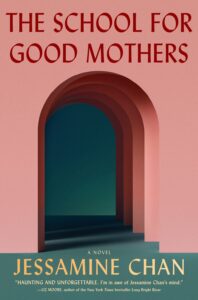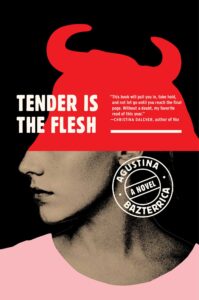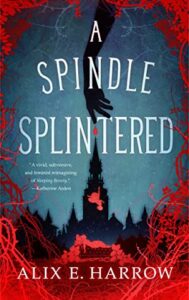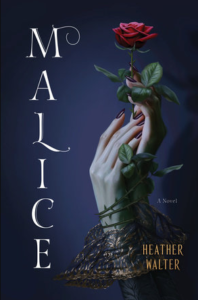
 Title: The School for Good Mothers by Jessamine Chan
Title: The School for Good Mothers by Jessamine Chan Published by Simon & Schuster
Published: January 4th 2022
Genres: Fiction, Dystopia
Pages: 336
Format: ARC
Source: Edelweiss, Publisher
Buy: Bookshop(afflilate link)
Goodreads
Chan’s The School for Good Mothers is a reflection on the government’s hold on social services, children, and women’s bodies/lives. In a similar vein of Margaret Atwood’s The Handmaid’s Tale, the events in this book teeter on our society’s imminent future, serving as both a criticism and a warning.In this taut and explosive debut novel, one lapse in judgement lands a young mother in a government reform program where custody of her child hangs in the balance.
Frida Liu is struggling. She doesn’t have a career worthy of her Chinese immigrant parents’ sacrifices. She can’t persuade her husband, Gust, to give up his wellness-obsessed younger mistress. Only with Harriet, their cherubic daughter, does Frida finally attain the perfection expected of her. Harriet may be all she has, but she is just enough.
Until Frida has a very bad day.
The state has its eyes on mothers like Frida. The ones who check their phones, letting their children get injured on the playground; who let their children walk home alone. Because of one moment of poor judgment, a host of government officials will now determine if Frida is a candidate for a Big Brother-like institution that measures the success or failure of a mother’s devotion.
Faced with the possibility of losing Harriet, Frida must prove that a bad mother can be redeemed. That she can learn to be good.
A searing page-turner that is also a transgressive novel of ideas about the perils of “perfect” upper-middle class parenting; the violence enacted upon women by both the state and, at times, one another; the systems that separate families; and the boundlessness of love, The School for Good Mothers introduces, in Frida, an everywoman for the ages. Using dark wit to explore the pains and joys of the deepest ties that bind us, Chan has written a modern literary classic.
Frida’s marriage has crumbled at the birth of her daughter, her ex-husband leaving her for another woman, and she is struggling coming to terms with her new life as a mother and an ex-wife. She leaves her daughter home alone for a couple of hours, to go to work, to escape the tedious and difficult reality, and she finds herself entangled with Child Protective Services as a result of her misjudgment.
She knew it was wrong to leave her child behind, knew it was not the best choice, and she hopes for some sympathy in her break in good judgment when the agency reviews her case. Frida is told that there is a new program being offered for reform for these “bad mothers,” and she is sent off to a reform school just outside the city with other mothers who have also made bad judgments for their children (ranging from relatively mild to extreme).
These schooled mothers are now under constant observation and evaluation with childlike animatronic dolls that record the mothers’ every move. Privileges are taken away if the mothers don’t adhere to strict rules and performances. The surveillance has an undercurrent of violence that is difficult to ignore, especially in contrast to the school for fathers that is seemingly much more relaxed.
The concept of a “perfect mother” can be incredibly damaging to anyone trying to live up to societal expectations, and especially to those with depression, anxiety, or other mental health issues that can interfere with day to day life, activities, and care. Lapses in judgment can happen to any of us, but how is a year’s worth of strict instruction and surveillance a better course of action than compassion and resources for parents navigating the raising of children? How are we to consider motherhood today, especially considering the shift of raising children from being a family/community task to being the task of a nuclear, “traditional” family with the figurehead being the mother? How are we to consider the “ideal motherhood” that’s rooted in heteronormative Western whiteness in contrast to the way in which other cultures view motherhood, parenthood, and the raising of a family?
Written in a clinical, stark style that fully showcases the horror simmering underneath the surface of the perception of perfect motherhood, The School for Good Mothers is a chilling, disturbing read that begs a second consideration of what it means to be a mother, what’s expected of mothers, and how we perceive motherhood in our society.
Review copy from Simon & Schuster via Edelweiss, thank you!

 Title:
Title:  Title:
Title:  Title:
Title:  Title:
Title: